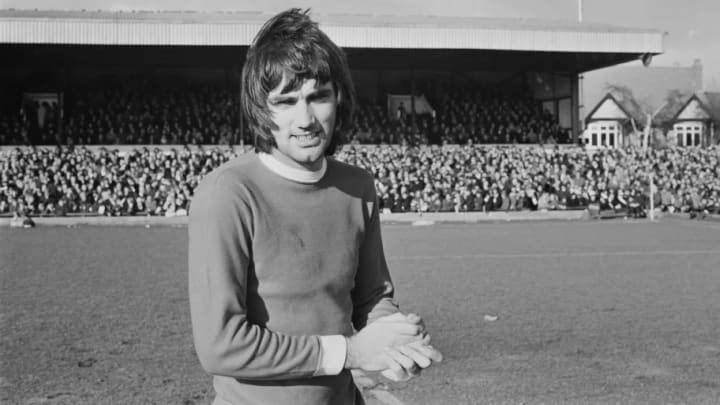6 of the Best Moments of George Best’s Career

George Best is number 18 in 90min's Top 50 Greatest Footballers of All Time series
George Best is one of the greatest players ever to grace English football, an individual as famous for his off-field lifestyle as his world class talents on the pitch.
In a whirlwind career that was over at the highest level by the age of 27, he achieved incredible heights most footballers could only ever dream of and had reached the pinnacle by 22.
Here’s a look at six of the best moment of George Best’s career…
Debut at 17
Spotted by Manchester United in Belfast aged 15, Best made his debut for Matt Busby’s team just four months after his 17th birthday in September 1963 – it was a side that was beginning to resemble the one that would go on to win the European Cup just under five years later.
That experience, a 1-0 win over West Brom, was initially a one-off for Best, but he earned himself a regular place in the team that December and never looked back.
He scored his first United goal three days after Christmas 1963 in a 5-1 win over Burnley.
League Champion
Best’s first full season in 1964/65 saw the birth of United’s fabled ‘Holy Trinity’ alongside Bobby Charlton and Denis Law, with the teenager hardly missing a game.
United finished top of the pile in England that season to the First Division title for the first time since before the tragic 1958 Munich Air Disaster. When the league campaign finished in late April, Best was still a week shy of his 19th birthday.
‘El Beatle’
The 1965/66 season saw United return to the European Cup and Best’s incredible rise to prominence went international. By now often wearing the number seven shirt he is most commonly associated with, he scored twice in a 5-1 demolition of the mighty Benfica in Lisbon.
He was dubbed the fifth Beatle by the stunned Portuguese press and was photographed wearing a sombrero as he stepped off the plane back in Manchester in a now iconic image.
European Cup Glory
United ultimately fell at the semi-final stage of the 1965/66 European Cup, but Best was back in the competition a couple of years later after winning his second league title in 1966/67.
The 1967/68 campaign would prove to be Best’s best, culminating in European Cup glory at Wembley. The final was another clash with Benfica and saw the United winger, remarkably only just 22, score what proved to be the decisive goal a few minutes into extra-time.
For Best it further underlined his already world class billing, while the club it was a tremendous achievement just 10 years after the tragedy of Munich.
Ballon d’Or
George Best shows his Ballon d’Or to his parents Anne and Dickie Best, 1968. pic.twitter.com/AKDzvBvo88
— MUFC History (@MUFC_Gallery) October 6, 2014
In total, Best scored 32 goals during the 1967/68 campaign, including 28 in the league.
He was rewarded for that form and his role in United’s European Cup win with the 1968 Ballon d’Or, following in the footsteps of Charlton and Law, both of whom had won in the decade.
Best finished narrowly ahead of Charlton in the final rankings, with the likes of Franz Beckenbauer, Luigi Riva and Eusebio among the others named in the top 10.
Six-Goal Haul
As the 1960s became the 1970s, Best found himself to be a young superstar in an ageing team and things were never better than 1968. But he continued to score goals on an individual level, despite the club’s failure to compete for silverware.
In January 1970, he put Northampton to the sword in an FA Cup tie when he scored six times in an 8-2 victory. That remains a post-war United record for most goals in a single game.
For more from Jamie Spencer, follow him on Twitter and Facebook!
90min's 'Top 50 Greatest Footballers of All Time' can be found here.
Number 50: Luka Modric
Number 49: John Charles
Number 48: Hugo Sanchez
Number 47: Jairzinho
Number 46: Omar Sivori
Number 45: Paolo Rossi
Number 44: Paul Breitner
Number 43: George Weah
Number 42: Kaka
Number 41: Lev Yashin
Number 40: Gunnar Nordahl
Number 39: Kevin Keegan
Number 38: Hristo Stoichkov
Number 37: Gianluigi Buffon
Number 36: Johan Neeskens
Number 35: Xavi Hernandez
Number 34: Luis Suarez
Number 33: Karl-Heinz Rummenigge
Number 32: Andres Iniesta
Number 31: Rivelino
Number 30: Bobby Moore
Number 29: Socrates
Number 28: Sandor Kocsis
Number 27: Lothar Matthaus
Number 26: Ronaldinho
Number 25: Ruud Gullit
Number 24: Bobby Charlton
Number 23: Giuseppe Meazza
Number 22: Raymond Kopa
Number 21: Romario
Number 20: Eusebio
Number 19: Marco van Basten